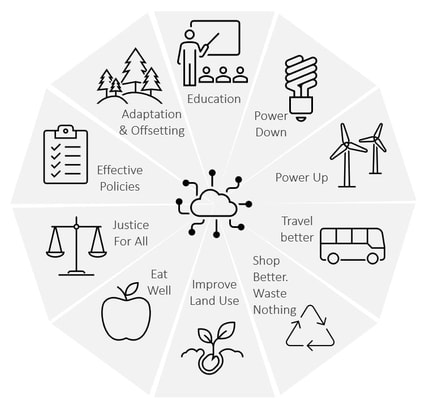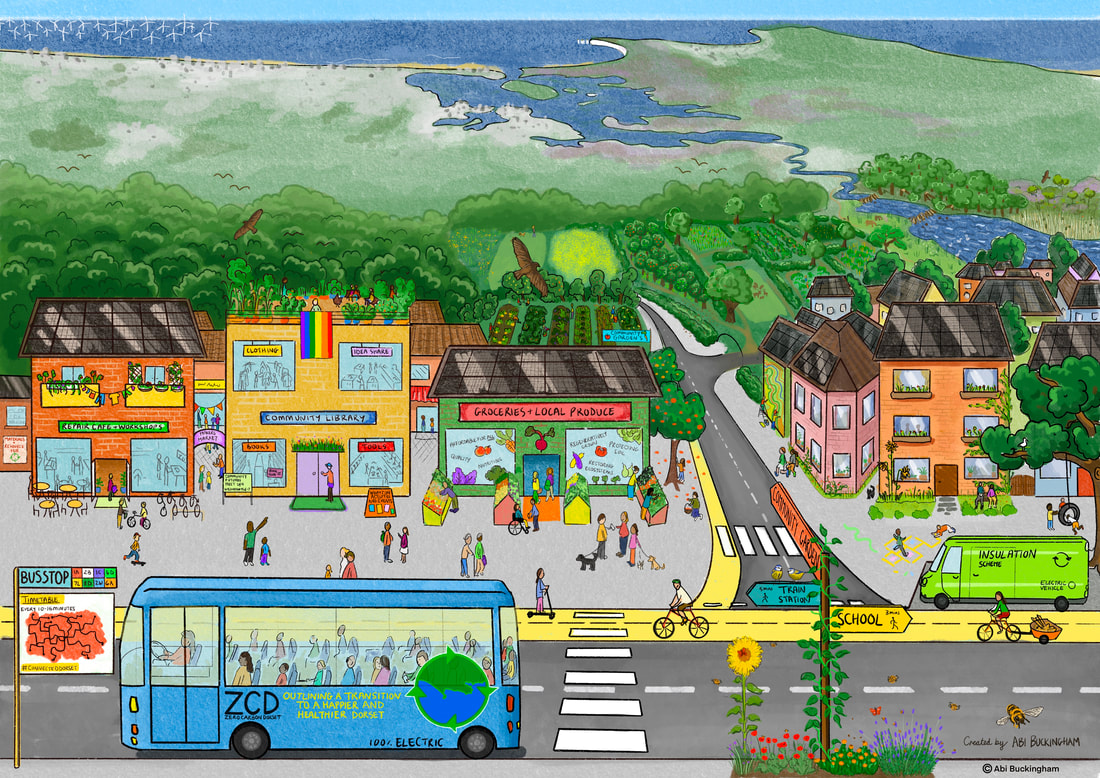Just imagine...
"It's 2030 and we have risen to the greatest challenge humanity has ever faced and, as well as preventing environmental breakdown, the solutions we have implemented have started to address many of society’s long-standing issues; the overwhelming majority of the population are leading happier, healthier lives, communities across Dorset are more connected, work-life balances have improved and everywhere the return of nature is evident."
|
Published in 2021 Dorset 2030 is a comprehensive report setting out this vision in detail, across all the areas we need to think about (shown in the 'wheel' to the right). Compiled by a team of volunteers, with input from the general public, academics and sustainability professionals it highlights the issues, potential solutions and more than 120 local stories of positive steps already taking place across the county, many led be community groups. The project continues to explore ways to raise awareness and inspire action, including the publication of annual reviews on progress. Discover more below... |
Find out more about ZCDClick on the video to the right of this text or head to our YouTube channel to find out more about our work or browse our library of local, national and global videos providing the background on why we need to change and the stories of those already doing so. |
|
The Dorset 2030 Report
Setting out specific vision statements of what living in a zero-carbon county in 2030 could be like, across a wide range of areas including education, reducing energy demand, moving to renewable energy, transport and justice, the report sets out how councils, including parish and town councils, and businesses can embed tackling the crisis across all policy areas so that decisions align with delivering the vision.
It also draws attention to the fact that whilst both councils declared Climate Emergencies in 2019, there is little evidence yet that they are acting as if it is an emergency. Their leadership, beyond just what they can do on their own estate, is crucial if Dorset is to play its part in tackling the crisis. While acknowledging the pandemic, a lack of funding and a coherent central government plan have hampered action, the authors call on both councils to take the lead and demand more from the government.
Acknowledging the climate and ecological crisis can appear to many to be too difficult and overwhelming to do anything about, the authors hope this report will inspire everyone to join in this critical debate, and encourage everyone to participate, taking action, no matter how small and insignificant it may appear, to build momentum for the changes needed.
It also draws attention to the fact that whilst both councils declared Climate Emergencies in 2019, there is little evidence yet that they are acting as if it is an emergency. Their leadership, beyond just what they can do on their own estate, is crucial if Dorset is to play its part in tackling the crisis. While acknowledging the pandemic, a lack of funding and a coherent central government plan have hampered action, the authors call on both councils to take the lead and demand more from the government.
Acknowledging the climate and ecological crisis can appear to many to be too difficult and overwhelming to do anything about, the authors hope this report will inspire everyone to join in this critical debate, and encourage everyone to participate, taking action, no matter how small and insignificant it may appear, to build momentum for the changes needed.
Background
Both Dorset and Bournemouth, Poole & Christchurch (BCP) Councils declared a climate and ecological emergency in 2019. These declarations are based on the scientific evidence that we have around a decade to take the required action to prevent greenhouse gas emissions exceeding levels which scientists agree will lead to irreversible and catastrophic climate change.
Recent reports from the Intergovernmental Panel on Climate Change [1] have identified that the consequences of allowing temperatures to rise by 2 degrees, rather than the 1.5 degree ambition set out in the Paris Climate Agreement, are stark; extreme weather events, rising sea levels, disruption to food supplies and potential societal instability, directly affecting 100’s of millions more people than at 1.5 degrees and indirectly threatening the whole of humanity. Continuing emissions at business-as-usual levels threatens our very existence. With emissions due to exceed the levels required to keep below a rise of 1.5 in the time detailed on the clock above, and with the limits to secure a better than 50% chance of staying within 1.5 degrees due to be exceeded in the time set out in the clock above, we must act now. Actions agreed at recent COPs in Glasgow & Egypt remain insufficient to address this issue.
Aligned with this we are witnessing an ecological catastrophe where extinction rates are up to 1000 times the underlying natural rate [2] and the very ecosystem that supports human life is under threat.
[1] IPCC Report (2018) https://report.ipcc.ch/sr15/pdf/sr15_spm_final.pdf (2019) https://www.ipcc.ch/report/srccl/ [2] https://conbio.onlinelibrary.wiley.com/doi/full/10.1111/cobi.12380
Recent reports from the Intergovernmental Panel on Climate Change [1] have identified that the consequences of allowing temperatures to rise by 2 degrees, rather than the 1.5 degree ambition set out in the Paris Climate Agreement, are stark; extreme weather events, rising sea levels, disruption to food supplies and potential societal instability, directly affecting 100’s of millions more people than at 1.5 degrees and indirectly threatening the whole of humanity. Continuing emissions at business-as-usual levels threatens our very existence. With emissions due to exceed the levels required to keep below a rise of 1.5 in the time detailed on the clock above, and with the limits to secure a better than 50% chance of staying within 1.5 degrees due to be exceeded in the time set out in the clock above, we must act now. Actions agreed at recent COPs in Glasgow & Egypt remain insufficient to address this issue.
Aligned with this we are witnessing an ecological catastrophe where extinction rates are up to 1000 times the underlying natural rate [2] and the very ecosystem that supports human life is under threat.
[1] IPCC Report (2018) https://report.ipcc.ch/sr15/pdf/sr15_spm_final.pdf (2019) https://www.ipcc.ch/report/srccl/ [2] https://conbio.onlinelibrary.wiley.com/doi/full/10.1111/cobi.12380
What do we mean by a vision?
|
The project aims to help show what living in a zero-carbon county would look and feel like, but we want everyone to join in developing this vision.
Arts University Design Graduate Abi Buckingham created a Dorset 2030 Vision** (above) to help bring many of the aspects of climate and nature friendly living to life. We aim to use Abi's vision to help start conversations about why we need the things she has drawn and what else we might need to do. In the video clip below Abi discusses the thinking behind the image and what motivated her to create it Climate Activist Xiye Bastida also shares her vision (below Abi's) How does these compare to yours? Follow our YouTube channel, Facebook and Instagram pages or LinkedIn site to join the conversation. ** Please note this drawing was produced for Zero Carbon Dorset by Abi and is copyright restricted. If you're interested in seeing more of Abi's work her Instagram is @abibuckinghamdesign and if you'd like to get in touch, her email is [email protected] |
|
Events
Following a launch event in March 2020, held in association with Bournemouth University a series of workshops were held looking at all the aspects of the Dorset 2030 report. Information on a few selected previous events can be found via the links below and more recent ones are available to view on our You Tube channel.
Monthly sessions continue to look in detail at specific areas, raising awareness and collating information to update the report findings.
You can find out about future events and hear when videos of previous events are posted by signing up via this link.
Monthly sessions continue to look in detail at specific areas, raising awareness and collating information to update the report findings.
You can find out about future events and hear when videos of previous events are posted by signing up via this link.
Can you help us?
All our work to date has been undertaken by volunteers. To keep the project going we welcome any offers for help. If you're passionate about action on climate and justice in Dorset and can spare a few hours to help with things like general admin, arranging events, preparing press releases, managing social media / webpages etc., please use the form below to get in touch.
Why Dorset?
The main reason for making this a Dorset wide project rather than, say 'Poole & Bournemouth', is the unique opportunity the County of Dorset presents; an area with the second largest conurbation in the South-West of England, a diverse landscape (with significant agricultural activity and Areas of Outstanding Natural Beauty) and a coast! It is difficult to think of many other areas which offer all the aspects that need to be considered when looking at addressing the climate crisis in the UK.




